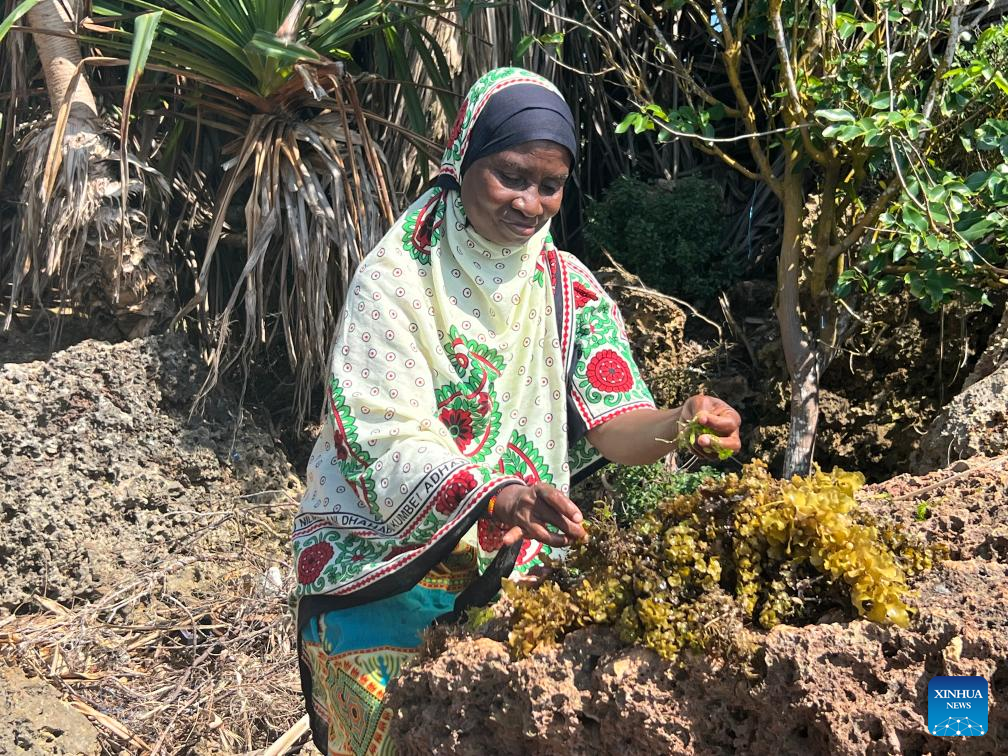
Saphia Hashim Makame, a seaweed farmer, deals with newly-harvested seaweed in Zanzibar, Tanzania, Oct. 21, 2023. (Xinhua/Hua Hongli)
ZANZIBAR, Tanzania, Oct. 22 (Xinhua) -- A visit to Bweleo, a stone's throw away from the Indian Ocean coastline in Zanzibar, finds soft-spoken Saphia Hashim Makame busy selling her seaweed products in her tiny shop.
Saphia, 58, a mother of six children, has been a seaweed farmer since 1998. She could not mince her words when she learned that seaweed products will for the first time be exhibited at the 6th China International Import Expo (CIIE) to be held in Shanghai, China, from Nov. 5-10.
"I am overjoyed over this good news. The expo will definitely open doors for seaweed products to the huge Chinese market," she told a team of Xinhua journalists as she arranged her seaweed products in her shop.
The products she makes from seaweed include soap, spices, skin jelly, hair oil, lip balm, shampoo, shower jelly, body lotion, cakes, juices, and buns.
"With the exhibition of seaweed products at the expo, my journey to finding global markets has just begun," said the woman, wearing a broad smile, adding that she currently sells her products to some institutions in Tanzania's port city of Dar es Salaam and individuals.
Saphia, who owns three hectares of seaweed, said she started farming the crop in 1998 and in 2006 she started making various products from seaweed after she was trained by experts from the Philippines and Indonesia in collaboration with Zanzibar's Institute of Marine Science of the University of Dar es Salaam.
She said seaweed farming has benefitted her a lot.
"I get between 1,500,000 Tanzanian shillings (about 600 U.S. dollars) and 2,000,000 Tanzanian shillings a month. I have built my own decent house, I pay for my children's medical bills and I have also paid fees for my children to university level without borrowing a single cent from anybody," said Saphia.
With the anticipated Chinese market for seaweed products, she was looking forward to creating a huge production structure because "seaweed is like gold and diamonds."
"The 6th CIIE is an entry point to Tanzania's Zanzibar seaweed products," quipped Aboud Suleiman Jumbe, principal secretary in Zanzibar's Ministry of Blue Economy and Fisheries.
"When we look at the Shanghai expo, we look at it with extremely high expectations," Jumbe said, noting that he hoped the Shanghai expo with a number of feasible outcomes that would propel forward Zanzibar's strategic seaweed market, especially in the area of the blue economy.
He told Xinhua in an interview that by the end of 2022, Zanzibar had already been producing about 12,594 tonnes of seaweed annually with exports of close to 14,000 tonnes of seaweed per year, adding that once Zanzibar secured the Chinese market the production of seaweed would double.
"Currently we have 23,000 seaweed farmers in Zanzibar and 90 percent of them are women," said Jumbe, adding that the farmers are cultivating mainly two types of seaweed -- eucheuma cottonii and eucheuma spinosum.
The Chinese government and the Chinese private sector have shown interest in coming to Zanzibar and developing new varieties of seaweeds that are used for various economic, medicinal, and biotech purposes in China and other parts of the world, he observed.
He said in Zanzibar seaweed farming began to gain pace in the late 1980s when new varieties of commercial seaweed crops were imported from the Philippines and other areas from the Far East. The official said seaweed has been a historic crop for many centuries for many people and it has been used in various ways in terms of food and pharmaceuticals.
Jumbe said since then Zanzibar has been transformed from an archipelago where seaweed used to grow in the wild into a modern-day commercial and production hub of seaweed crops in the western Indian Ocean region.
He said since Zanzibari President Hussein Ali Mwinyi came into power in 2020, the government has been transforming the growth of the seaweed industry in Zanzibar through various programs, including supplying new fiber boats to seaweed farmers.
"Zanzibar has been involved in growing the crop at a commercial level, specifically focusing on these two varieties," said Jumbe. ■



